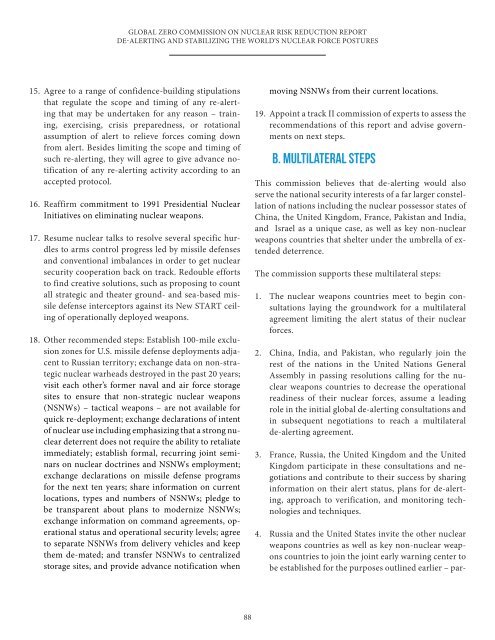global_zero_commission_on_nuclear_risk_reduction_report
global_zero_commission_on_nuclear_risk_reduction_report
global_zero_commission_on_nuclear_risk_reduction_report
Create successful ePaper yourself
Turn your PDF publications into a flip-book with our unique Google optimized e-Paper software.
GLOBAL ZERO COMMISSION ON NUCLEAR RISK REDUCTION REPORTDE-ALERTING AND STABILIZING THE WORLD’S NUCLEAR FORCE POSTURES15. Agree to a range of c<strong>on</strong>fidence-building stipulati<strong>on</strong>sthat regulate the scope and timing of any re-alertingthat may be undertaken for any reas<strong>on</strong> – training,exercising, crisis preparedness, or rotati<strong>on</strong>alassumpti<strong>on</strong> of alert to relieve forces coming downfrom alert. Besides limiting the scope and timing ofsuch re-alerting, they will agree to give advance notificati<strong>on</strong>of any re-alerting activity according to anaccepted protocol.16. Reaffirm commitment to 1991 Presidential NuclearInitiatives <strong>on</strong> eliminating <strong>nuclear</strong> weap<strong>on</strong>s.17. Resume <strong>nuclear</strong> talks to resolve several specific hurdlesto arms c<strong>on</strong>trol progress led by missile defensesand c<strong>on</strong>venti<strong>on</strong>al imbalances in order to get <strong>nuclear</strong>security cooperati<strong>on</strong> back <strong>on</strong> track. Redouble effortsto find creative soluti<strong>on</strong>s, such as proposing to countall strategic and theater ground- and sea-based missiledefense interceptors against its New START ceilingof operati<strong>on</strong>ally deployed weap<strong>on</strong>s.18. Other recommended steps: Establish 100-mile exclusi<strong>on</strong>z<strong>on</strong>es for U.S. missile defense deployments adjacentto Russian territory; exchange data <strong>on</strong> n<strong>on</strong>-strategic<strong>nuclear</strong> warheads destroyed in the past 20 years;visit each other’s former naval and air force storagesites to ensure that n<strong>on</strong>-strategic <strong>nuclear</strong> weap<strong>on</strong>s(NSNWs) – tactical weap<strong>on</strong>s – are not available forquick re-deployment; exchange declarati<strong>on</strong>s of intentof <strong>nuclear</strong> use including emphasizing that a str<strong>on</strong>g <strong>nuclear</strong>deterrent does not require the ability to retaliateimmediately; establish formal, recurring joint seminars<strong>on</strong> <strong>nuclear</strong> doctrines and NSNWs employment;exchange declarati<strong>on</strong>s <strong>on</strong> missile defense programsfor the next ten years; share informati<strong>on</strong> <strong>on</strong> currentlocati<strong>on</strong>s, types and numbers of NSNWs; pledge tobe transparent about plans to modernize NSNWs;exchange informati<strong>on</strong> <strong>on</strong> command agreements, operati<strong>on</strong>alstatus and operati<strong>on</strong>al security levels; agreeto separate NSNWs from delivery vehicles and keepthem de-mated; and transfer NSNWs to centralizedstorage sites, and provide advance notificati<strong>on</strong> whenmoving NSNWs from their current locati<strong>on</strong>s.19. Appoint a track II <str<strong>on</strong>g>commissi<strong>on</strong></str<strong>on</strong>g> of experts to assess therecommendati<strong>on</strong>s of this <strong>report</strong> and advise governments<strong>on</strong> next steps.B. MULTILATERAL STEPSThis <str<strong>on</strong>g>commissi<strong>on</strong></str<strong>on</strong>g> believes that de-alerting would alsoserve the nati<strong>on</strong>al security interests of a far larger c<strong>on</strong>stellati<strong>on</strong>of nati<strong>on</strong>s including the <strong>nuclear</strong> possessor states ofChina, the United Kingdom, France, Pakistan and India,and Israel as a unique case, as well as key n<strong>on</strong>-<strong>nuclear</strong>weap<strong>on</strong>s countries that shelter under the umbrella of extendeddeterrence.The <str<strong>on</strong>g>commissi<strong>on</strong></str<strong>on</strong>g> supports these multilateral steps:1. The <strong>nuclear</strong> weap<strong>on</strong>s countries meet to begin c<strong>on</strong>sultati<strong>on</strong>slaying the groundwork for a multilateralagreement limiting the alert status of their <strong>nuclear</strong>forces.2. China, India, and Pakistan, who regularly join therest of the nati<strong>on</strong>s in the United Nati<strong>on</strong>s GeneralAssembly in passing resoluti<strong>on</strong>s calling for the <strong>nuclear</strong>weap<strong>on</strong>s countries to decrease the operati<strong>on</strong>alreadiness of their <strong>nuclear</strong> forces, assume a leadingrole in the initial <str<strong>on</strong>g>global</str<strong>on</strong>g> de-alerting c<strong>on</strong>sultati<strong>on</strong>s andin subsequent negotiati<strong>on</strong>s to reach a multilateralde-alerting agreement.3. France, Russia, the United Kingdom and the UnitedKingdom participate in these c<strong>on</strong>sultati<strong>on</strong>s and negotiati<strong>on</strong>sand c<strong>on</strong>tribute to their success by sharinginformati<strong>on</strong> <strong>on</strong> their alert status, plans for de-alerting,approach to verificati<strong>on</strong>, and m<strong>on</strong>itoring technologiesand techniques.4. Russia and the United States invite the other <strong>nuclear</strong>weap<strong>on</strong>s countries as well as key n<strong>on</strong>-<strong>nuclear</strong> weap<strong>on</strong>scountries to join the joint early warning center tobe established for the purposes outlined earlier – par-88


